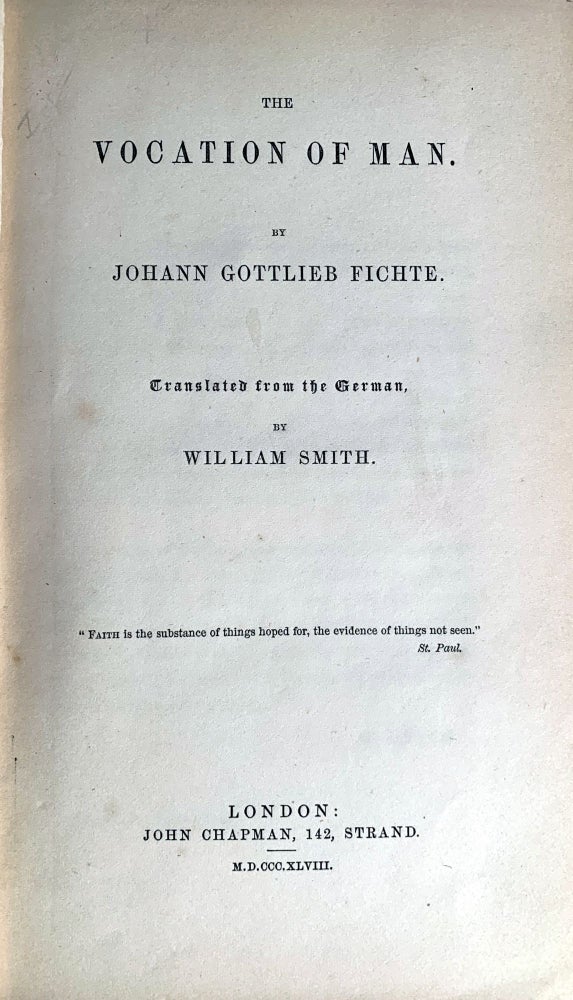
The Vocation of Man
London: John Chapman, 1848. 8vo. 198 pp., plus 2-page advertisement of Fichte’s popular works and life followed by a 32-page publisher’s catalogue da. FIRST EDITION OF THE ENGLISH TRANSLATION. Publisher’s cloth, embossed emblem of the Catholic Series on covers, corners slightly worn, rebacked with the orginial label; interior very good. From the library of Chichester Fortescue, Lord Carlingford, with his bookplate and signature dated March, 1849 on the paste-down, and some pencil annotations at the end of the text. Item #13001
First edition of the English translation by William Smith. Fichte identifies three distinct stages in the development of human existence and the striving for conscious knowledge both theoretical and practical: 1. doubt 2. knowledge 3. faith. Fichte published his famous Wissenschaftslehre, an “essay towards a critique of all revelation” which was an exposition and clarification of Kant’s work, in 1794. He followed up over the next few years covering the theoretical side of his system. Here Fichte reaches for the source of human knowledge, arriving at two conflicting views of human existence: Humans are subject to the cause-and-effect laws of nature, yet their ability to reason will raise humans above the strict necessity that controls the natural world. He concludes that our vocation “is not merely to know but to act in accordance with [our] knowledge.”
Fichte (1762-1814) was a German philosopher, one of the founding figures of the philosophical movement known as German idealism, often perceived as a figure whose philosophy forms a bridge between the ideas of Kant and the German idealist Hegel.
Chichester Fortescue, Lord Carlingford (1823-1898), was educated at Christ Church, Oxford where he took a first in classics and won the chancellor’s English essay. From 1847 to 1874 he was elected to parliament for Louth as a liberal. He was junior lord of the treasury, under-secretary of state for the colonies, and succeeded Robert Peel as chief secretary for Ireland under Lord Russell. On formation of Gladstone’s first administration he became president of the Board of Trade, later lord privy seal and president of the council. He shared the burden and the credit of some great reforms following the disestablishment of the Irish Church. John Stuart Mill described his measure as the most important passed by the British parliament since the Roman Catholic Emancipation act. He was raised to the peerage as Lord Carlingford, and succeeded Lord Spencer as president of the council. Carlingford lived with his wife, Frances Elizabeth Anne, Lady Waldegrave (1821-1879), at Strawberry Hill, which she had inherited before their marriage, including all of Walpole’s library and artifacts.
Price: $1,500.00



